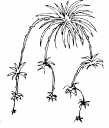
"se los devoró la selva!"

The above marks the end of La vorágine (1924), Rivera's most famous work. The story addresses the old dichotomy of civilization and barbarie. The latter is embodied in the primeval jungle which prevents the inroads of civilized life. Besides the ideas of civilization versus barbarie, La vorágine is also about nation building and the exclusion of nonwhites as members of the Colombian nation. The bad guys in the narrative, for example, they are either indians or mulattos. The novel celebrates patriarchy and the nation state as the ultimate goals of social organization in Colombia. The nation state is, in fact, seen as the natural step in the consolation of patriarchal ideology. At the end of the novel, the white poet (Cova) and his would-be wife (Alicia) are devoured by the enemy of civilization: the jungle.